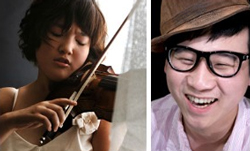by Timothy Robson

Jinjoo Cho is a multi-prize winner in national and international competitions, with many solo recitals and concerto performances already in her relatively short career. After studying at the Curtis Institute of Music, she returned to study at the Cleveland Institute of Music. She now studies with Jaime Laredo. HyunSoo Kim is a CIM graduate and recently joined the CIM collaborative piano staff. Both are technically accomplished with strong musicality.
In brief spoken notes Jinjoo Cho described the program as consisting of “war sonatas”; each of the works, by Debussy, Janáček, Joan Tower, and Prokofiev, were composed during the various wars of the 20th and early 21st century.
Claude Debussy’s Sonata No. 3 in G minor (1916-17) was Debussy’s last completed work, and it is said that he composed it while German bombs were exploding around him in Paris in the midst of World War I. The sonata is a set of strong and abrupt contrasts in mood and dynamics. Cho and Kim controlled the mercurial nature of the work so that it hung together as a whole. The first movement had typically lush impressionism; the second was a “fantasy,” sometimes almost grotesque, with odd, out-of-place pizzicato notes. The third movement was filled with arcs of shimmering piano sound, against streams of violin scales and arpeggios.
Leoš Janáček also composed his Violin Sonata, JW 7/7 in 1914 during the First World War, but continued to tinker with it after the end of the war, not completing it until 1921. It is austere and angular, with moments of serenity and lyricism, but without the long and memorable melodic lines that fill his orchestral music and operas. The ostinati that often feature in Janáček’s music are there, but fragmentary, and not as much in evidence as in other works. Cho and Kim gave an impassioned performance. Here, as elsewhere in this concert, the players were equal partners in the duo, each deferring to the other at appropriate moments. In the accompanied works (the sonatas by Debussy, Janáček and Prokofiev) HyunSoo Kim showed astonishing technique, but also the ability to rein in his tone as to not cover the violin. Balances throughout were well-judged.
American composer Joan Tower’s String Force for solo violin was written as a commissioned work for the 2010 Indianapolis Violin Competition. The blurb for the published score blandly states “the 7-minute work was an attempt at writing a challenging piece for violin,” which is the understatement of the week. The writing requires the utmost technical skill on the part of the performer. It is a study in extremes of range, texture and dynamics. At one point the violin plays a passage that resembles the strident sounds of an air-raid siren. Without reference to the score, it is impossible to know the accuracy of Jinjoo Cho’s performance, but it was committed and fearsomely dramatic.
Sergei Prokoviev’s Sonata No. 1 in F minor, Op. 80, was written throughout the duration of World War II, and is a tour de force for violin and piano. This is a sonata and performance to be admired, if not exactly loved; Prokofiev is at his grimmest here. Melody is at a minimum, although there are alluring moments, for instance the muted violin and shining piano sound in the third movement. The piano often has the interesting melodic material, with the violin decorating musically around it. There are many passages in which violin and piano play in unison octaves, fiendishly difficult to keep together at fast tempi. Finally, in the last movement, marked Allegrissimo (very fast), the key changes from F minor to F major. But to end, Prokofiev returns to the unsettling soft music from the third movement. As in the rest of the program, Cho and Kim played with musicianship that matched their technique. They were rewarded with a well-deserved, lengthy ovation.
Continuing the theme of war and peace, Cho and Kim offered as an encore their own transcription of Francis Poulenc’s song “Priez pour paix” (Pray for Peace). It was a moment of respite ending an emotionally and intellectually challenging program.
Published on ClevelandClassical.com February 12, 2014
Click here for a printable version of this article.



